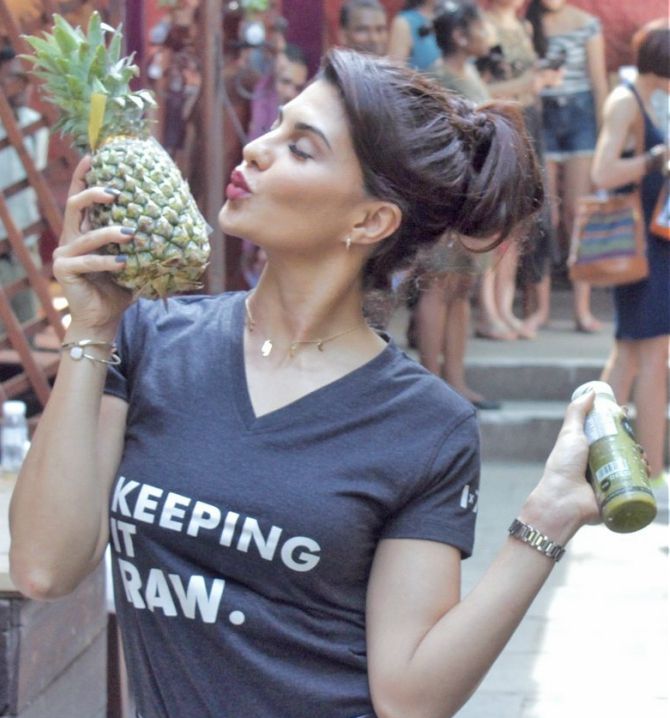Anuj Rakyan, the entrepreneur behind Raw Pressery, has seen his business valuation grow 50 times in 3 years.
The sky is the limit, he tells Rediff.com's A Ganesh Nadar.

Photograph: Kind courtesy @RawPressery/Twitter and @anujrakyan/Twitter.

It all started when Anuj Rakyan (pictured left) was looking for a drink in the market and could not find one without preservatives.
Disappointed, he started making his own fresh juices in his mother's kitchen -- giving birth to the idea of Raw Pressery.
"I would wake up at 4 am to reach the market for fresh stock of fruits and vegetables," Rakyan says, sitting in Mumbai's iconic Taj Palace hotel on a rainy afternoon. "I believe in learning from the local farmers who bring in fresh produce everyday."
"I would buy the fruits and vegetables, treat them and make them into juices or smoothies and then set out to deliver the bottles to the few clients I had initially."
"Time was the most important factor, so was the need to see that the juices were delivered within the time frame that didn't allow bacteria growth."
That was in 2014.
Today, Raw Pressery Juices are made with a unique cold press technology that avoids oxidation and preserves the nutritional value of fruits and vegetables.
Raw Pressery offers a carefully selected blend of ingredients in the form of juices. From Shield to Run and Glow to Lean, each of the juices is aimed at addressing a specific nutritional need of the body.
Between 2014 and now, Rakyan's business valuation has already increased 50 times. And the 37 year old, who has just finished delivering a lecture about his successful start up, says he is confident that it will continue to grow at this remarkable rate.
Tell me about your education?
I did my under grad in the United States (Duke University). Then I did a course in marketing.
I did not go in for a masters degree.
I was an investment banker and then a brand consultant.
I came back to India, and got into diamonds and then jewellery. I spent 10 years in that business before starting this venture.
How many people do you employ?
We now have 197 people working for us.
is this technology available in the West?
It is a very expensive technology. One machine costs about a million dollars.
Apart from the machine, the infrastructure around the machine is very expensive.
The leading company in the US that uses this is Suja. Coca Cola has invested in it. Pepsi has brought a brand from it.
Starbucks owns a cold press.
What I am saying is that leading companies in the world are realising that this is the future of the drinks market.
What was your initial investment?
I put in ₹80 lakh (₹8 million) of my own money, then friends and family helped.
I started off with about ₹1.5 crore (₹15 million).
What were your initial teething problems?
There were no teething problems as such. It was all about building scale.
For us, the challenge was with a limited shelf life can we get to the point where we can buy this machine.
Before the machine were you manually making the juices and selling them?
Absolutely! But we scaled very quickly.
What is the capacity of this $1 million machine?
We have two now. Each machine has a capacity of 350,000 litres a month. It's about 1.5 million units.
So, now where is your business?
Last year, we grew 125 per cent.
The year before, we grew 140 per cent.
And this year, we will grow 180 per cent.
When we started, my company was valued at ₹5 crore (₹50 million); today we are valued at ₹250 crore (₹2.5 billion).
In three-and-a-half years there has been an explosion of expansion.
How many products have you added since you started?
We started with 6 flavours, which were exotic and also had nutrition value.
We have expanded it wider. We have simple products too, like orange and sugar cane. Earlier, you could drink sugar cane juice only on the streets.
We have 30 drinks now, which includes juices, smoothies, almond milk.
Lately, we have added soups.
We will soon add food products.
The food products, which will come out next year, will be labeled 'clean label'.
This means there will be no added sugar, preservatives or any chemicals.
It will be natural food, just as if you cooked it at home.
You can open the packet and start eating. You can warm it if you want, but it is not necessary.
Your products have a shelf life of 21 days. What if it doesn't sell in that period?
We take back the product on the 16th day and distribute it at our events while it is still safe to use it.
It all depends on the retailer and whether he maintains the fridge at a certain temperature at all times.
We have seen retailers who have allowed ice cream to melt.
We do a lot of events and sampling, and we make sure the product is not wasted.
And you also take your empty bottles back?
Yes! We collect empty bottles from shops and also homes when it reaches a certain quantity.
We send it to Reliance where it is turned into polyester fibre, which in turn is stitched into school uniforms and distributed free to poor students.
How long do you think you can maintain this high rate of expansion?
If you look at the shelves in shops you will realise that the future is in fresh drinks.
You have to decide whether you want aerated drinks, carbonated drinks or fresh drinks without preservatives or additives.
You will realise that everyone wants fresh juice now.
The sky is the limit for our expansion.










